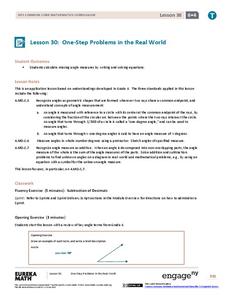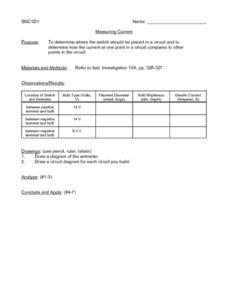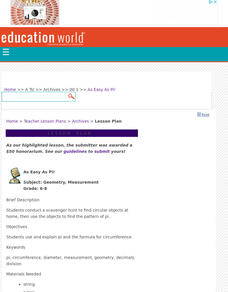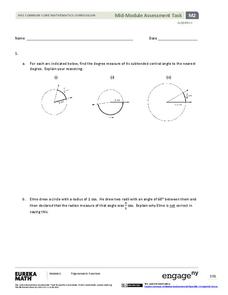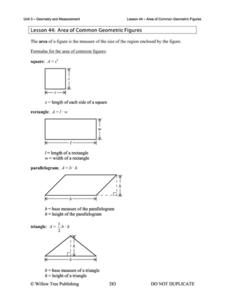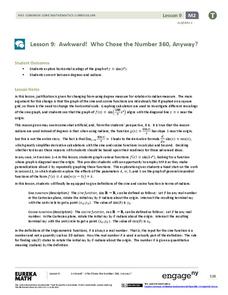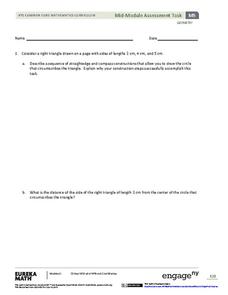EngageNY
One-Step Problems in the Real World
Mirror, mirror on the wall, which is the fairest resource of them all? Individuals write and solve one-step equations for problems about angle measurement, including those involving mirrors. Both mathematical and real-world problems are...
Curated OER
Measuring Current
In this measuring current instructional activity, students determine where the switch should be placed in a circuit and how the current at one point in a circuit compares to other points in the circuit. Students also draw diagrams of an...
Curated OER
As Easy As Pi!
Students conduct a scavenger hunt to find circular objects at home, then use the objects to find the pattern of pi.
Curated OER
Circular Trigonometric Functions
In this trigonometry/Algebra II activity, students use convert between radian and degree measure, find the value of trigonometric functions, and show that given relationships are true. The three page activity contains seventeen...
Curated OER
Bubble Mania
Elementary schoolers practice measuring a soap bubble print. They follow a recipe to make a soap bubble solution. Pupils use the soapy solution to blow large bubbles with a plastic drinking straw until they pop leaving behind a circular...
EduGAINs
Discovery of Pi
Serve up a slice of math for Pi Day! A combination of fun, hands-on lessons and helpful worksheets encourage learners to practice finding the radius, diameter, and circumference of different circles.
EngageNY
Algebra II Module 2: Mid-Module Assessment
Time for classes to show what they've learned. Use several tasks to assess understanding of the trigonometric functions, unit circle, radians, and basic trigonometric identities.
Curated OER
Discovering Pi
Define terminology related to a circle. Practice accuracy in measuring and then create a spreadsheet based on data collected from solving for parts of a circle. Groups can have fun analyzing their data as it relates to Pi.
Los Angeles County Office of Education
Assessment for the California Mathematics Standards Grade 2
Test scholars mathematic skills with an assessment addressing addition, subtraction, multiplication, place value, measurement, geometric shapes, expanded notation; and their ability to compare numbers, write number sentences, draw...
EngageNY
The Inscribed Angle Alternate – A Tangent Angle
You know the Inscribed Angle Theorem and you know about tangent lines; now let's consider them together! Learners first explore angle measures when one of the rays of the angle is a tangent to a circle. They then apply their newfound...
Los Angeles County Office of Education
Assessment for the California Mathematics Standards Grade 3
Assess scholars' knowledge with a 22-page assessment that covers place value, patterns, probability, estimation, measurement, geometric figures; and their ability to add, subtract, multiply and divide proficiently.
Willow Tree
Area of Common Geometric Figures
Scholars can use area formulas, but can they apply what they know about area? The activity challenges learners to think logically while practicing finding area of shapes such as rectangles, circles, parallelograms, triangles, and other...
Curated OER
Are You Full of Hot Air?
Explore the concept of measuring and recording circumference. In this physical science and measurement lesson, young learners blow up balloons, measure the circumference, and record the data on an interactive graphing website.
Curated OER
How Big is Barbie?
Students measure various dimensions of a male and a female dolls body and scale them proportionally to average human measurements. They calculate the appropriate scale factor (magnitude) to enlarge their doll and apply that scale factor...
Mathematics Assessment Project
Temple Geometry
Temper your excitement of temple geometry. Using algebraic and geometry concepts to determine various measurements in a circle diagram, scholars determine the shaded area of the diagram.
Los Angeles County Office of Education
Assessment for the California Mathematics Standards Grade 1
Here is an assessment designed to test mathematicians' knowledge of writing numbers, comparing numbers, skip counting, solving addition and subtraction problems; along with measuring objects, telling time, identifying shapes, reading...
West Contra Costa Unified School District
Arcs and Angles
Noah didn't construct this kind of arc. High school scholars first explore how angles can be formed in circles. They then learn relationships between angles and arcs by conducting an exploratory activity where they position and draw arcs...
EngageNY
Awkward! Who Chose the Number 360, Anyway?
Don't give your classes the third degree. Use radians instead! While working with degrees, learners find that they are not efficient and explore radians as an alternative. They convert between the two measures and use radians with the...
EngageNY
Geometry Module 5: Mid-Module Assessment
How can you formally assess understanding of circle concepts? Pupils take a mid-module assessment containing five questions, each with multiple parts.
Balanced Assessment
Bicycle Chain II
Apply geometric concepts to a design problem. Individuals examine the structural setup of the chain on a bicycle and use the measurements of the circles to determine the length of the chain.
Curated OER
Pumpkin Predictions
It's time for Halloween and math! Perfect for Fall, this simple worksheet provides a grid for young mathematicians to record their predictions about a pumpkin's height, stem length, diameter, circumference, and weight. After learners...
Curated OER
Surface Area and Volume
In this surface area and volume instructional activity, 8th graders solve 11 various geometry problems that include determining the surface area and volume for the measurements given and finding the surface area for each solid shown....
Curated OER
Comparing Areas
Before your scholars know how to multiply side lengths to find an area, give them some practice in simply counting units. They examine shapes that have already been segmented into units, counting them to get the area. There are three...
Curated OER
Math Games for Skills and Concepts
A 27-page packet full of math games and activities builds on algebra, measurement, geometry, fractional, and graphing skills. Young mathematicians participate in math games collaboratively, promoting teamwork and skills practice.


